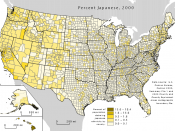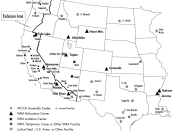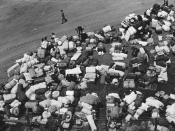With Liberty and Justice for All?
The United States Misuse of Power over Japanese Americans during World War II
The internment of Japanese Americans during World War II has long been a topic of debate. The government of the United States has claimed this action, after the surprise attack on Pearl Harbor, was a "military necessity", taken as a means of national security. Hirabayashi v. United States and Korematsu v. United States were two of the major cases heard by the Supreme Court with regards to this issue, both resulting in rulings against the Japanese Americans, stating they were disloyal to the United States and a danger to society. However, a closer examination of statements made at the time by political leaders and the treatment of this population at such camps lends more weight to the theory that their imprisonment was based not on actual evidence, but more on racism and wartime paranoia.
Up until the second world war era, Japanese Americans had been an integral part of the growth and development of the west coast of the United States. In agriculture, the Japanese American farmers were able to successfully turn the Auburn and Kent valley into productive farms raising fruits and vegetables which were sold at the Pike Market in Seattle. Eventually, they ended up producing almost half of the fresh fruit and vegetable crops in California. Industrially, the Japanese Americans gave the economy a much needed boost by teaming up with the Chinese Americans to build a number of railroads--most famously the Transcontinental Railroad--thus allowing both the manufacturing and tourism businesses in the area to expand and flourish. However, all of this was completely ignored after Pearl Harbor.
"The white man's civilization has come into conflict with Japanese barbarism and one of them must be destroyed," said John...



Nice
This is a really great essay, however, I think if you are going to write with an opinion, you should at least include both sides of the issues, such as that they have proven japanese spies gave info about pearl harbor. overall, a good essay
2 out of 2 people found this comment useful.